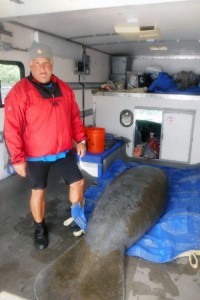
Update April 11, 2013: The tide has killed 241 of Florida’s roughly 5,000 manatees, according to the Florida Fish and Wildlife Research Institute, and the toll appears certain to rise.
A red tide bloom along the southwest Florida coast has claimed the lives of 174 manatees so far this year, and one Fort Myers man is working to keep that record number from growing.
Fred Rubino, a retired police officer and rescue diver, was inspired to learn more about manatees after completing the Florida Master Naturalist Program coastal module with Florida Sea Grant extension agents Bryan Fluech, Collier County, and Joy Hazell, Lee County.
Inspiration turned into a passion for this threatened species, leading Rubino to volunteer with the Florida Fish and Wildlife Conservation Commission’s manatee rescue team.
On March 5, Rubino went on his fourth manatee rescue mission. But this mission, which happened to be on a particularly cold day, had more meaning for him.
“I spent an hour-and-a-half hanging off my boat in the mangroves, holding the manatee’s head above water until I got some help,” said Rubino, who FWC dispatched to the distressed mammal in Fort Myers’ Orange River. “I was the closest resource and had to stabilize the animal until the rescue team could arrive.”
A manatee distressed by red tide will have difficulty lifting its head to breathe and gasp for air at the surface. Its lips may quiver as it experiences seizures, and it may float or swim off balance on its side.
Once a manatee is rescued, the FWC harmful algal bloom team tests the manatee’s blood to monitor red tide toxin levels and works with partners, like Tampa’s Lowry Park Zoo, who rehabilitate the mammal. Fortunately, manatees rescued from red tides generally recover fully and can be released to their natural habitat as soon as they are healthy and the environment is safe.
Rubino’s rescue is now on the mend at the Lowry Park Zoo, and Rubino has since saved another manatee. The FWC and partners have rescued 12 manatees suffering from the effects of red tide so far this year, and Rubino was involved in five of those rescues.
“If anyone ever asks me if I talk to manatees, the answer is now, ‘Yes I do,’” he said.
If you see a sick, injured or dead manatee, please report it to FWC’s Wildlife Alert Hotline by calling 888-404-FWCC (3922). It is important to note that it is a second-degree misdemeanor to tamper with manatees in the wild, so do not jump in the water like Rubino.
To learn more about the Florida Master Naturalist Program, visit www.masternaturalist.ifas.ufl.edu.
For more information on manatees, visit http://bit.ly/10KIKw4.




